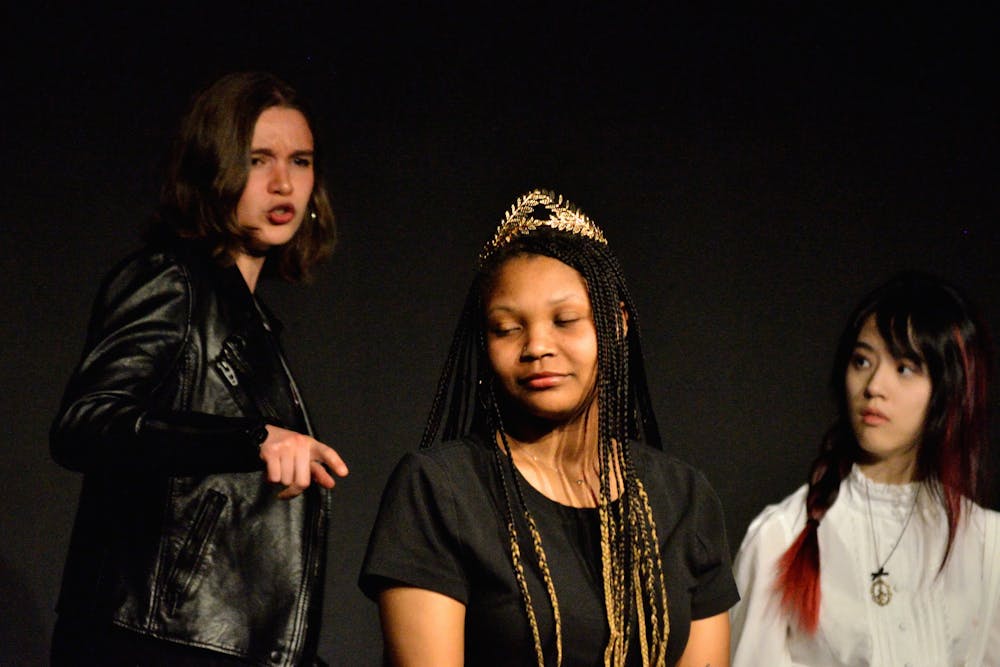Why do we keep returning to Greek tragedy? These ancient texts and the way we study them in classrooms can often feel rigid, distant and disconnected from the present. The Department of Classics’ Medea on Trial, held on April 24, offered a compelling answer. It was a student production that was as comedic as it was thoughtful, re-examining the stories of ancient women in what director and Professor Maria Gerolemou described as “a kind of scientific experiment grounded in the humanities.”
The production was written, produced and performed by the students of the class Women in Greek Drama: Feminist Perspectives from Text to Stage, taught by Gerolemou. Drawing from across the Greek canon, it brought together female figures — including Antigone, Clytemnestra, Phaedra and more — to interrogate Medea’s infamous act of infanticide. At the end, the audience chose via voting whether Medea faces death or exile.
Though Medea on Trial is ostensibly about justice, it plays less like a courtroom drama and more like a philosophical debate. It focuses on questions like “What drove Medea to her act? What kind of system produces such a response in Medea?” which Gerolemou posed in her prologue.
Across the six core scenes, each dealing with different themes such as motherhood, female agency, madness and legacy, these female characters brought their own past entanglements with power to the case, whether as transgressors, victims or both. Though the characters were all women, they offered sharply different perspectives on Medea’s actions. While doing so, some argue within the moral frameworks that have long been used to judge women.
For those, like myself, with scant prior knowledge of Greek tragedy, this wide cast of unfamiliar characters may have felt overwhelming at first. But as they voiced their own take on Medea’s actions, their backstories and motivations came through gradually.
Standout moments included “Scene 2: Motherhood and Marriage,” where Clytemnestra (Zari Newman)— who previously murdered her husband — and Electra (Amanda Butler), who killed Clytemnestra after this murder, exchanged heated insults and jabs about their violent past. This created a tension that was both funny and interesting to watch. In “Scene 5: Eros, Sexuality, and the Body,” Phaedra (Cecilia Wang) gave a haunting performance as a woman destroyed by forbidden sexual desire. Women who displayed power in seemingly dutiful ways, like Lysistrata (Madison Epner) and Antigone (Daphne Hartch), offered a moral counterpoint to Medea’s brutal assertion of power through infanticide.
The debates were passionate, funny, introspective and sharply written, with both clever and scathing accusations and moments of communion. At one point, Alcestis (Diana Murtaugh) climbed upon a chair to scold King Creon (John Wolfe), earning widespread gasps and laughter from the audience. Though these characters came from ancient texts, the dialogue was written in poetic yet modern language, which kept the energy high and the ideas accessible.
In an interview with the The News-Letter, Gerolemou described Medea on Trial as an example of experiential learning. “Ancient theater is movement, voice... It’s not enough to sit down in the classroom, read the text, the scholarly apparatus and so on. It’s very important to try to understand it through our own body,” she explained.
Gerolemou emphasized that the project was about developing skills beyond academic study: “It’s very important to push people, to force younger generations, our students, to go out and experiment... Be prepared to forget their lines. That’s a skill you cannot find in the library.”
Despite their age, Gerolemou sees these texts as deeply resonant with the present. “These texts are charged — we don’t always use that word, but they are,” she said. “Sometimes they feel a little parochial or political, but they still speak to us. That’s why we still teach them. They’re modern, actually. Very, very modern.”
The students echoed this sense of discovery in the creative process. After selecting their characters, they conducted research, rewrote lines and reworked the script based on their interpretations. Karen Dong, who served as creative producer and understudy, said, “One thing that really helped was our class discussions. We could all talk together and find different things we might not have noticed on our own.”
On the production’s broader themes, Murtaugh (who performed Alcestis) noted, “The reputation of women throughout history is so dependent upon them behaving well, and that’s total crap. But really, it’s completely tied to gender.” Khaya Cliett, who performed Medea, added, “If it were a man, they would have been like, ‘I wonder why, maybe it was a sacrifice.’ But if a woman does it, she becomes a monster.”
Reflecting on the audience’s final choice to sentence Medea to exile, Cliett said, “We were discussing which one is worse. Death is easier, because she escapes a lot of things. Exile means living with that guilt... My character always trusts death. I felt bad enough for Medea... I didn’t want to wish society’s judgment on her.”
The project was made possible with support from the Department of Classics and Vice Dean for Undergraduate Education and Professor Erin Rowe. Though not an official Theater Arts & Studies department production, Medea on Trial managed to be both sharply funny and critically probing. Judging by the audience’s laughter and reactions, it succeeded in making Greek drama feel relevant and alive.





